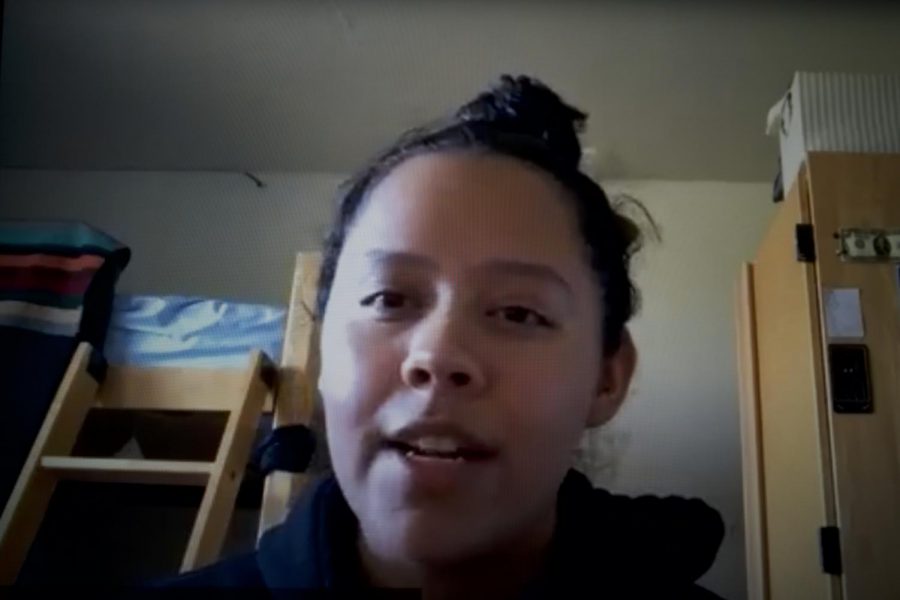First-year students, ALAs, DLAs share residence hall advice for incoming freshmen
June 15, 2020
This article is a part of the START issue, a guide for all incoming Oregon State University students and their families going through START, which aims to help familiarize them with the campus, college life, academic success and more.
With new social distancing measures and policy changes being enforced in the upcoming fall term, the environment of residence halls, for some, may play an even more important role in shaping college life for incoming freshmen.
The experience of living on campus in residence halls is multifaceted and full of new faces, new opportunities and, for most, unforgettable memories. Every residence hall is unique in some way, but they all share a variety of resources for students to access.
Hannah Koehler, a second-year biohealth student with the pre-med option, currently works as an academic learning assistant in Sackett Hall. Her advice for incoming freshmen living in dorms is to get involved as soon as possible, ask questions when you need help or are curious, and to go to events you wouldn’t normally go to.
“When I first started, I was a first-generation student; I didn’t have any parents or siblings that had gone to school, and so I didn’t know what a midterm was. And so I came to school and I was like ‘what is going on?’ So I think asking questions, putting yourself out there, and getting involved is a great way to tackle a new environment,” Koehler said.
Jiemyjoyce Reduque is a second-year computer science major, working as an ALA in Cauthorn Hall. In regards to living in a dorm for the first time, Reduque recommends taking a chance and knocking on your neighbor’s door. She also reminds incoming freshmen that the classroom is not the only place to find an education.
“Education isn’t just school. You can learn in any kind of way, in any kind of capacity, whether that’s engaging with people; challenging people,” Reduque said.
The Diversity Learning Assistant in Cauthorn Hall, Madelene Marroquin Salazar is a third-year transfer student studying environmental engineering. For incoming freshmen living in dorms, Marroquin Salazar suggests looking at digital tours of dorm rooms on the University Housing & Dining Services website and checking what is allowed to be brought into the dorms. She also recommends examining current study habits and thinking about how those may change entering a new school, especially during this time.
Meanwhile, Sonica Gupta, a fourth-year student with a computer science major working as an ALA at the International Living-Learning Center said incoming freshmen will be in a new environment and will have a million things thrown at them.
“I would just say, embrace it all, you’re going to forget half of it, it’s okay. Get people’s numbers. You’re going to meet a bunch of people and you might wanna reach out to them a month or so down the road when you’ve settled in,” Gupta said.
Tia Wilhelm, a first-year student majoring in ecological engineering, who lived in McNary Hall, said everyone’s different.
“I actually took a gap year before going to [Oregon State University] and living in the dorms. So, I think that changed my experience a little bit. But I would encourage people to trust themselves and be patient because it’s a lot of change, and a lot of people in a space trying to connect so immediately with each other. And that was really hard. I guess my advice is to try and be compassionate with yourself and patient with the process of getting used to a new environment, and new friends, and new people, and a new lifestyle, and just all the newness that is thrown at you,” Wilhelm said.
Some key aspects of living in residence halls include doing laundry, cleaning, sharing bathrooms, and attending hall events.
For Koehler, in terms of experiencing dorm life, like learning how to cook and do dishes, it’s all about trying things out and making adjustments as needed.
“If you’re going to do laundry, put a timer on your phone because people will take your laundry out and set it on top to take your washer. Just put it in, set your timer for one to two minutes before it finishes, so you can be there when it opens,” Koehler said.
Koehler said she always does her laundry when she stays up late studying and recommends using the LaundryView app to check which washers and dryers are available for convenience. In terms of cleaning, Koehler has a set schedule for herself.
“For me, I always clean on Fridays, I don’t know why, but it just feels like a cool way to end the week; everything’s ready for the weekend,” Koehler said.
Reduque, however, suggests doing laundry on the most free weekday available, because many students do it on the weekends when it is more difficult to find a washer or dryer available. In regards to bathrooms in residence halls, Reduque would like incoming freshmen to know OSU has gender-inclusive restrooms for non-binary individuals. Instead of challenging their existence, she said she hopes people are in a space of learning and ask why, conceptually, those bathrooms are there.
“I’ve had experiences and I’ve seen things where people put messages on doors on gender-inclusive restrooms saying ‘why do these exist,’ ‘this should be a male/this should be a female restroom’—please don’t challenge that because we’re trying to make an inclusive space,” Reduque said.
Reduque also said that there is a lot going on in residence halls, so if you can make it to events, do it, but you can’t, don’t feel forced.
“If you have the time but not the capacity, don’t go,” Reduque said.
Once a student is in college, Reduque said it is important for them to understand the responsibility that comes with making decisions.
“You’re going to have to learn skills that you might not have known how to do. Your parents aren’t there to remind you to clean your room, your parents aren’t there to remind you to do your homework. Your professors are not there to remind you to do your homework. They will not,” Reduque said.
To help freshmen deal with these responsibilities, Reduque urges students to ask their ALAs for help, especially with the COVID-19 pandemic going on.
“I’m there to help support you, not just in academics, but in college. ALAs are a great first start. If I don’t know, I can find someone who does know. It’s my job to search on things that I might not know about, but I can find someone to connect you with,” Reduque said.
Marroquin Salazar said it is important for students to keep in mind that they can check out cleaning products from the front desk or they can purchase them from campus markets like EBGBs and Cascadia.
“Making sure you have soap prior to coming is very important, you don’t wanna forget that. I would recommend dryer sheets, people often use dryers and sometimes they can smell a bit funky, so dryer sheets help with that,” Marroquin Salazar said.
Wilhelm said she did her laundry in the mornings on the weekends, when there were fewer people around, and tried keeping her room a clean space for the week.
“So I sort of established the habit of cleaning my room on Sunday nights before everything picked up the pace and stuff for the week. And that was nice, to just have a clean slate at the beginning of the week,” Wilhelm said.
In regards to hall events, Wilhelm said she went to a lot of events at the beginning because of the energy from people around her and was able to connect with people and stay in contact with them.
“I think that it’s a great opportunity to be open and vulnerable to the space you’re putting yourself into and just seeing what it has to offer, because there are so many people all together, and it’s a unique experience to be in such close proximity to them and have the opportunity to connect with all these people,” Wilhelm said.











































































































